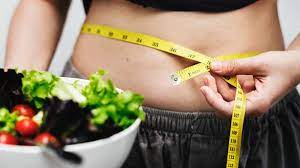I want to start this post on the importance of weight with a series of questions. So I encourage you to write down the answers on a piece of paper as probably, once you read the article, you will change your opinion or at least in most cases it will be my intention.
I already tell you that the purpose of this post is to break with many beliefs and to emphasize that the importance does not fall exclusively on weight, nor will it be the only indicator to assess a process of change in eating habits and healthy lifestyle. The word diet comes from the Greek “diaita”, which means lifestyle. Therefore, the word diet is not associated with or synonymous with losing weight or losing weight, although it is something that many of you have always thought. It is simply a healthy and balanced lifestyle.
Diet and weight
In the event that your goal of changing your habits is to lose weight, I remind you of the following: weight is not a 100% reliable indicator. Our body weight is the sum of all body tissues and it is considered a traditional anthropometric measure together with height.
What is the body mass index?
BMI is a widely accepted criterion but it is not accurate. It classifies people as underweight, normal weight, overweight and obese, based exclusively on the individual’s mass and height. This criterion would not take into account age, sex, body fat percentage or muscle mass. Therefore, weight is an indicative measure.
Difference between muscle mass and fat mass
1- Volume.
The space occupied by fat is much larger than that occupied by muscle. This is because the density of fat is lower (it weighs less than muscle), so two people of the same height can weigh the same, but two totally different volumes can be seen.
2- Energy required
Muscle mass is metabolically more active than fat. That is to say, while the body is at rest, muscles can burn more calories per day than body fat.
3- Gain or increase in the body
Muscle reacts when physical activities that generate a greater daily stress than usual are performed. Fat, on the other hand, increases when more calories are consumed than the body can process.
If body weight is still a very important indicator for you and is one of the main reasons to make a change in your eating habits, I want to help you understand the following: a weight does not determine your achievements or process of change In addition to body composition, there are other factors that can influence weight, making it even less important.
What factors can weight depend on?
- Presence of inflammation due to digestive problems or food intolerances among others.
- Taking or presence of drugs.
- Phase of menstrual cycle (luteal, pre-menstrual, menstruation, ovulation)
- Weighing schedule: morning, afternoon, evening, night (the later, the heavier the weight)
- Practice or not of physical activity.
- Presence or consumption of alcohol.
- Stress management
- It often happens that poor stress management or lack of resources to manage and tolerate high levels of stress leads to the inappropriate use of food as a tool to mitigate this stress, causing compulsive or very disordered intakes and, consequently, unwanted weight gain.
- Bloating or abdominal distension (digestion process, intolerances, menstrual cycle…).
- Weight on an empty stomach or after meals.
- Hydration (hydrated, dehydrated, amount of water drunk throughout the day)
- Scale (each scale is different and do not weigh the same, do not pretend to weigh the same at home as in the scale with which we weigh you in consultation).
At the Júlia Farré Nutrition Center we will teach you to give importance to other factors to assess your process of change towards a healthier lifestyle. Probably as a result of this your weight will go down although if you are doing physical activity (especially strength) once again the weight will not be a very representative indicator. Remember that muscle weighs more than fat.
Aspects that really do determine a change process:
- Anthropometric measurements and contours.
- Although these are much more reliable measures than weight, in some cases they may not be very representative (food intolerances, heavy digestions, mentrual cycle).
- Percentage of fat
- Although the bioimpedance scale can give us an estimate of the fat percentage, the results can also be altered (alcohol consumption, menstrual cycle, pathologies such as lipedema…). To make a more accurate estimate we could do skinfold anthropometry.
- Improvement in your intestinal transit.
- You feel lighter and more deflated, thus improving your digestion.
- You eat more slowly and calmly, enjoying the moment.
- You ensure your daily intake of vegetables and fruits.
- You prepare more balanced meals by introducing different food groups in your main meals: vegetables + carbohydrates + protein + healthy fats.
- You have increased your water intake and feel more hydrated throughout the day.
- You are getting better organized: shopping, planning and preparing your meals.
- You treat yourself more from self-care and less from control, guilt or punishment.
- You have reduced food anxiety and have better stress management.
- You feel more energetic and vital.
- You are less sedentary and practice sports as a way to disconnect and improve your health and not with the sole purpose of losing weight.
- You reduce your alcohol consumption and drink on more special occasions.
It is not a diet, but nutritional reeducation.
Probably if we look back and review the questions asked at the beginning of the post you define the word diet as a diet to lose weight, restrictive, temporary and with quick and linear results. I am sorry to inform you that this is not so because it is not a diet but to follow a healthy lifestyle through nutritional education as I have been discussing in previous sections. Food and nutrition education can be defined as the process through which people and societies are empowered to voluntarily adopt healthy eating habits and lifestyles. In this section I will focus on explaining the differences between diet (what you think it is) and healthy lifestyle (what it really is).
Fast diets
Fast diets that are proposed with the aim of losing weight or losing weight as quickly as possible do not include a fundamental need, such as changing the necessary lifestyle habits so that the weight achieved can be maintained. On the other hand, most of them have no scientific basis, so they have not demonstrated their efficacy or safety, and the risks they carry, in addition to the economic expense that some of them may entail. You probably want to lose weight fast, but you do not want your health to be harmed. Therefore, we do not recommend following quick diets but a healthy lifestyle that helps to improve your health in the long term, since you can lose weight by following a low-calorie diet according to your tastes and food preferences without the need to make many restrictions or avoiding food groups such as carbohydrates.
Expectation
Another important aspect to highlight is the expectations. Ending up satisfied with the results depends on your expectations. It is important to understand that this is not a linear process and that the same circumstances will not always apply. As I have already mentioned, there are factors that can alter the weight (menstrual cycle, weighing time, hydration) but also situations or commitments (Christmas, vacations, sedentary lifestyle, mood, weather …). Let me give you a very simple example: isn’t it true that 365 days a year are not always the same? With food is exactly the same, do not demand yourself to carry out a 100% healthy diet always.
So, what does a healthy hypocaloric diet consist of?
- It is based on nutritional education, teaching, empowerment and delivery of resources and healthy tools, not on restrictions and temporary food prohibitions.
- Personalized and individualized. Adapted to your tastes, availability, schedules, objectives, pathologies (if any). It is not a standard guideline for everyone.
- Flexible and not boring. The personal tastes of each person should be taken into account to create the maximum possible adherence while maintaining pleasure. It should not be boring or monotonous.
- Balanced, incorporating the different food groups avoiding any nutritional deficit, not based on restrictive diets, supplements, shakes or compensations.
On the one hand, from a physiological point of view, very restrictive diets have an effect on weight regulation and alteration in our signals and/or sensations of satiety and appetite.
satiety and appetite.
On the other hand, from the psychological point of view, they also have a great emotional impact: restriction and rapid weight loss can cause possible binge eating, emotional and compulsive eating and therefore, this lack of control can lead to hypercontrol; thus generating feelings of anxiety, frustration, guilt and discomfort.
Starting a healthy lifestyle is not something easy nor is it an overnight process, it is a transition and a learning process.
It is a process of transition and learning, so I ask you to be patient and calm. During a process of changing habits you will experience many emotions and feelings and you will understand that relapses and acceptance are also part of it.
The role of psychonutrition
If you see that you do not have a good relationship with food or you feel identified with some of these feelings (anxiety, guilt, frustration, excessive control) perhaps you should consider the need to seek help from a professional psychologist who can help you to solve emotional and psychological aspects and to restore a balanced and healthy relationship with food.













